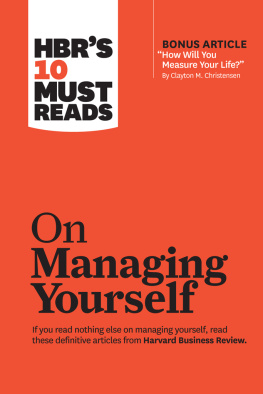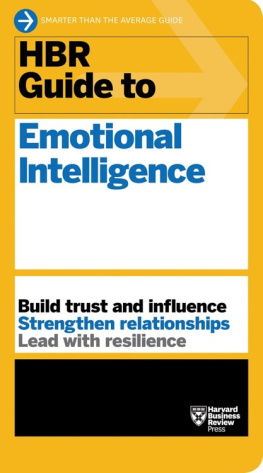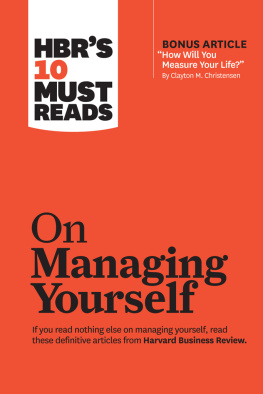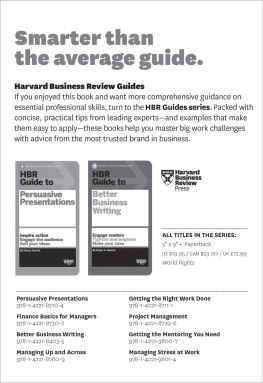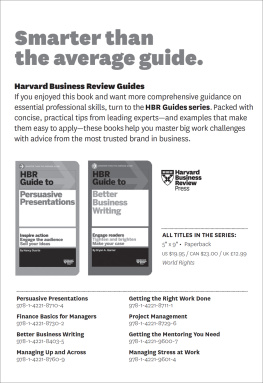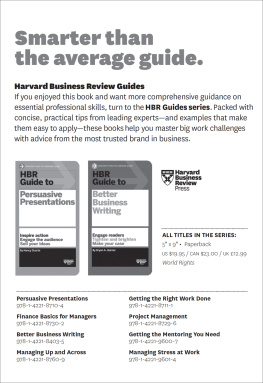
Management Tips
From Harvard Business Review
Harvard Business Review Press
Boston, Massachusetts
Copyright 2011 Harvard Business School Publishing Corporation
All rights reserved
Printed in the United States of America
10 9 8 7 6 5 4 3 2 1
No part of this publication may be reproduced, stored in or in troduced into a retrieval system, or transmitted, in any form, or by any means (electronic, mechanical, photocopying, recording, or otherwise), without the prior permission of the publisher. Requests for permission should be directed to . harvard.edu, or mailed to Permissions, Harvard Business School Publishing, 60 Harvard Way, Boston, Massachusetts 02163.
Library of Congress Cataloging-in-Publication Data
Management tips / by Harvard business review.
p. cm.
ISBN 978-1-4221-5878-4 (alk. paper)
1. Management. 2. Leadership. 3. Organizational change.
I. Harvard business review.
HD31.M293893 2011
658dc22
2011016547
The paper used in this publication meets the requirements of the American National Standard for Permanence of Paper for Publications and Documents in Libraries and Archives Z39.48-1992.
About the Book
Management Tips is a compilation of the Management Tip of the Day by Harvard Business Review . Adapted from blog posts and other content, these tips offer quick and practical advice on how to manage yourself, manage your team, and manage your business. Please turn to the List of Attributions at the back of the book for more information on the sources from which these tips were adapted, and visit hbr.org for more tips and content.
Managing Yourself
Create a New Leadership Vision
Now is the time to clarify and refine your leadership vision. This requires both articulating your values and reexamining your goals for the future.
Start by identifying the four or five most important episodes in your lifemoments that defined who you are today. For each episode, articulate how it shaped your values.
Then draft a statement of your personal leadership vision. This is a compelling image of an achievable future. Describe the kind of leader you want to become and the major contributions you want to make to the world between now and 2025. What will you be doing in 2025, and what impact do you hope to be making?
Pretend You Have What You Want
Your mind is often your greatest tool, but as anyone who has been taken over by fear, frustration, or worry knows, it can also be your greatest enemy. Whether youre concerned that you dont have the respect of your peers or that a customer isnt calling you back because shes gone to a competitor, overthinking the issue only serves to compound the worry. Instead, pretend you have what you want. Act as if your peers respect you or as if the customer is loyal. These may be fantasies, but what youre worrying about may be as well. Its better to stop the worry and act confidently; chances are better that youll get what you want.
Take Ownership
Autonomy, influence, and a sense of meaning are all associated with lower stress. If you need to find more joy, take on a new project that will improve your job, team, or workplace. While you may not have the same degree of freedom that an entrepreneur does, you can find ways to set the agenda and claim ownership of tasks and projects. This ownership will likely improve your job satisfaction while adding an important accomplishment to your rsum.
Take Responsibility for Your Growth
Responsibility for your professional development lies squarely on your shoulders. No matter your situation, use these tips to keep sharp:
- Meet with two former coworkers each month. Talk about your industry and where it is headed. This will keep you tapped into the community.
- Have one major learning experience each quarter. If your work isnt giving you the necessary challenges, seek out other opportunities. Volunteer for a nonprofit, attend a conference, or take a class.
- Give yourself a performance review. Reflect on your growth and performance, whether through a formal process or not. Be honest with yourself about your strengths and weaknesses and what you should focus on in the coming year.
Increase Your Desire to Learn
Dont let your ego get in the way of your desire to learn. Successful leaders keep their minds open to new things because they know that no matter how high their level of mastery, there is always more to discover. If youve become an expert in one field, seek out other fields where you can transfer and apply your expertise. When facing challenges, even ones youve faced many times before, adopt a learners approachask questions or find new ways to solve the problem.
Give Yourself a Leadership Workup
Many of us wait until were sick to see a doctor. However, preventive medical assessments have been shown to improve health, save lives, and reduce medical costs. Prevention can be beneficial to leadership assessments too. Often people are asked to see a coach or participate in a 360-degree assessment when troubles surface. Yet, time and money (not to mention headaches) could be saved if leaders underwent thorough assessments before problems arose. Ask the people around you for feedback about whats working and whats not. Be sure you understand their expectations and where you may not be meeting them, or are unnecessarily exceeding them. Having a complete understanding of where you are as a leader gives you a greater sense of control and power to shape your future.
Work on Your Backhand
When youre particularly good at something, its easy to rely on that strength. For example, if your forehand is your stronger stroke, youll position yourself to use it much more often. But turning weaknesses into strengths will give you a competitive edge and make you a more effective leader. Focus energy on improving your weak points. Think about your last performance review or ask your peers what one capability you really need to succeed in the current environment. Theres no better way to impress than to reveal a killer backhand when everyones expecting your forehand.
Shed Your Excessive Need to Be You
One of the worst habits a leader can have is excusing his behavior with claims like, Thats just the way I am! Stop clinging to bad behaviors because you believe they are essential to who you are. Instead of insisting that you cant change, think about how these behaviors may be impeding the success of those around you. Dont think of these behaviors as character traits, but as possibilities for improvement. Youll be surprised how easily you can change when it helps you succeed.
Be Open to Criticism
Constructive criticism is essential for creativity, innovation, and problem solving. Since leadership requires all three, leaders need to be sure not only that they are open to criticism, but that they actively seek it out. Dont simply ask for general feedback but ask peopledirect reports, peers, customersto poke holes in your ideas and approaches. Critique can be a useful approach to test ideas and keep people and teams accountable.
Listen Better
For years, leadership experts have been encouraging managers to improve their listening skills. Good listening isnt just about making the speaker feel respected and heard; its also about making sure you understand whats truly said. Here are three tips for better listening:
- Think. Engage in the conversation by thinking ahead and anticipating what the speaker is going to say. Try to anticipate the conclusions. Dont just hear the words.
Next page



